|
|
|
Sort Order |
|
|
|
Items / Page
|
|
|
|
|
|
|
| Srl | Item |
| 1 |
ID:
145453
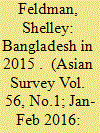

|
|
|
|
|
| Summary/Abstract |
The year 2015 was the most violent in Bangladesh since independence. A growing sense of fear and insecurity prevailed, along with a crisis of governance that limited social accountability. However, there were notable contributions to global climate change initiatives, and the Land Boundary Agreement with India offered enclave dwellers the rights of citizenship after almost 70 years.
|
|
|
|
|
|
|
|
|
|
|
|
|
|
|
|
| 2 |
ID:
148471


|
|
|
|
|
| Summary/Abstract |
The rise of big data has brought with it enormous possibilities, for better or worse. In China, the government has been enthusiastically preparing for the coming of the era of big data. This article examines how the authoritarian regime in China has been employing big data to improve its governance and to move towards a ‘Big Brother 2.0’ model. The regime has combined cooptation with coercive control to exploit digital technology, in order to maximize its utility and thus maintain authoritarian rule. Moreover, existing debates on digital technology largely focus on the changing power structures between state and society, but neglect power structures within regimes and their implications for authoritarianism. This article argues that the use of massive digital data may backfire against the authoritarian regime as it may change the power structure within the state. That is to say, efforts to embrace big data may also undermine the authoritarian rule. A more accurate understanding of the Chinese authoritarian regime's resilience and vulnerability in the information age will help us grasp the essence of China's rise as a fragile global power.
|
|
|
|
|
|
|
|
|
|
|
|
|
|
|
|
| 3 |
ID:
145908
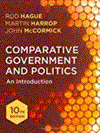

|
|
|
|
|
| Edition |
10th ed.
|
| Publication |
London, Palgrave, 2016.
|
| Description |
xv, 366p.pbk
|
| Standard Number |
9781137528360
|
|
|
|
|
|
|
|
|
|
|
|
Copies: C:1/I:0,R:0,Q:0
Circulation
| Accession# | Call# | Current Location | Status | Policy | Location |
| 058716 | 320.3/HAG 058716 | Main | On Shelf | General | |
|
|
|
|
| 4 |
ID:
105252
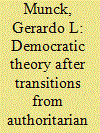

|
|
|
|
|
| Publication |
2011.
|
| Summary/Abstract |
Recent events across the globe make clear the complexities of the politics of "democratization" and the importance of developing nuanced and compelling understandings of these complexities. In Eurasia, "Color Revolutions" have given way to democratic disappointments and "authoritarian regimes." In north Africa, an unanticipated upsurge of democratic movements has felled autocrats in Tunisia and Egypt, but the political outcomes of these "transitions" are very much in doubt. Contemporary political science has developed an elaborate vocabulary for understanding such processes. And this vocabulary owes a great deal to a small group of scholars-Juan Linz, Guillermo O'Donnell, Philippe Schmitter, Alfred Stepan and Adam Przeworksi-who helped to lay the theoretical foundations of our current understanding of politics around the globe.
|
|
|
|
|
|
|
|
|
|
|
|
|
|
|
|
| 5 |
ID:
193156


|
|
|
|
|
| Summary/Abstract |
Going beyond the external functions of a diplomat this article places itself within the New Diplomatic History field and engages with an intricate aspect of the diplomatic self, that of duty. By telling the story of Christos Xanthopoulos-Palamas, one of the most prominent Greek diplomats, it examines how diplomatic duty is rationalised and imported in the realm of politics under authoritarian rule. Based on memoires, archival material, published diaries and the press of the time, this study follows Xanthopoulos-Palamas’ career and examines how the experienced diplomat justified his cooperation with the regime of the colonels despite his distaste for their antidemocratic practices. The belief in a concept of duty to the nation that surpasses the ephemeral existence of political structures and thus compelling him to strive to keep the ‘national aircraft’ afloat is at the core of his rationalisation behind his decision to get involved in domestic politics during the dictatorship.
|
|
|
|
|
|
|
|
|
|
|
|
|
|
|
|
| 6 |
ID:
146711
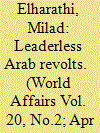

|
|
|
|
|
| Contents |
Examining scholarly literature on the recent and ongoing changes in the Arab world, this article makes a comparative analysis of the conceptual definitions of social, political and non-political revolutions to draw certain themes and explains regional events in the light of various ideological and sociological theories. It concludes that most Arab states are trapped in the conundrum of authoritarian rule or chaos and remain hostages of the secular military or Islamist “deep state” oligarchies.
|
|
|
|
|
|
|
|
|
|
|
|
|
|
|
|
| 7 |
ID:
115062
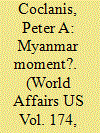

|
|
|
|
|
| Publication |
2012.
|
| Summary/Abstract |
For some time now, human rights and pro-democracy activists in the West have waged a tireless campaign against the military regime that in one way or another has controlled Myanmar (the former Burma) since Ne Win's coup in 1962. Since 1995, activists have urged tourists to boycott the country, and for years numerous governments in the West, most notably the US and members of the EU, have levied sanctions of one sort or another against individual generals, various Myanmar banks, and, at times, Myanmar exports in general. The goals may be laudable, but the activists, for all their intense interest in Myanmar, seem to be behind a curve whose outlines should concern them deeply-the fact that the current government appears to be turning its back on almost fifty years of authoritarian rule.
|
|
|
|
|
|
|
|
|
|
|
|
|
|
|
|
| 8 |
ID:
189272
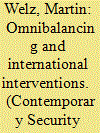

|
|
|
|
|
| Summary/Abstract |
This article studies why authoritarian states participate in international interventions. Troop contributions of such states indicate the support of authoritarian leaders for a liberal-cosmopolitan order that entails the protection of human rights internationally, while they deny such rights to their own citizens. I focus on the decisions of Chad’s long-term president Idriss Déby Itno to take an active stance in various international interventions. The analysis builds on the theory of omnibalancing, which holds that authoritarian leaders balance external and internal threats to ensure their survival. I demonstrate how Déby used troop deployment as part of his omnibalancing strategy. It allowed him to stay in power until his death in 2021 and made Chad’s democratization unlikely. For Déby’s omnibalancing not only quelled the domestic opposition and silenced international critique against the authoritarian rule, but also contributed to the securitization of the state.
|
|
|
|
|
|
|
|
|
|
|
|
|
|
|
|
| 9 |
ID:
089640


|
|
|
|
|
| Publication |
2009.
|
| Summary/Abstract |
Regular elections have become a common feature in Moroccan politics. While elections were "contested" as an instrument of control until the mid-1990s, starting with the 1997 parliamentary elections - and followed by those in 2002 and 2007 - Morocco established an electoral system as the keystone of royal power based on limited political participation. At the same time, since 1997 the Moroccan political system has witnessed the arrival of a "newcomer," the Islamist Hizb al-'Adl wa al-Tanmiyya (Justice and Development Party), which the Kingdom integrated into the electoral process. Based on Joseph Schumpeter's intrinsic-value theory of electoral politics, this article will analyze this unique electoral process and the potential that it holds for Morocco's democratization. Evidence from public opinion research is used to argue that the electorate's de-politicization has engendered a shaky alliance in favor of electoral politics. The consequence of this is a contradiction that may be typical of elections in authoritarian states. On one hand, the indirect values of elections are a push towards greater debate about the meaning of democracy. On the other, the electoral process also results in the reproduction of patron-client relations, which undermine any indirect, abstract values that are produced in the very same process. This, in turn, can be considered an inherent weakness of the process for political parties that aim at establishing a democratic force for change.
|
|
|
|
|
|
|
|
|
|
|
|
|
|
|
|
| 10 |
ID:
111845
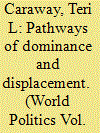

|
|
|
|
|
| Publication |
2012.
|
| Summary/Abstract |
Legacy unions-formerly state-backed unions that survived democratic transitions-are one of the most persistent legacies of authoritarian rule. While usually successful in maintaining their preeminent position, legacy unions have in some cases been overtaken by competing unions. Deploying a set of paired comparisons of legacy unions that entered the transition with similar legacies but experienced different fates-Indonesia with South Korea and Poland with Russia-this article examines why some legacy unions continued to dominate (Indonesia and Russia) and others did not (South Korea and Poland). The author identifies four pathways of change: endurance (Indonesia), attrition (South Korea), hegemony (Russia), and rupture (Poland). Several features of the transition context propelled legacy unions down distinct pathways of change-the widespread mobilization of workers outside of state-sponsored unions early in the transition, partisan links, and the structure of union competition.
|
|
|
|
|
|
|
|
|
|
|
|
|
|
|
|
| 11 |
ID:
084761


|
|
|
|
|
| Publication |
London, George Allen and Unwin, 1970.
|
| Description |
201p.hbk
|
| Standard Number |
043200672
|
|
|
|
|
|
|
|
|
|
|
|
Copies: C:1/I:0,R:0,Q:0
Circulation
| Accession# | Call# | Current Location | Status | Policy | Location |
| 004678 | 320.95/SCO 004678 | Main | On Shelf | General | |
|
|
|
|
| 12 |
ID:
116306


|
|
|
|
|
| Publication |
2012.
|
| Summary/Abstract |
Fiji's post-colonial journey has been fraught, a promising beginning hobbled by political instability, periodic military coups and stagnant economic growth. Political disagreements over the best form of political representation have featured prominently in Fiji's political discourse, with no enduring resolution in sight.
|
|
|
|
|
|
|
|
|
|
|
|
|
|
|
|
| 13 |
ID:
151416
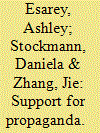

|
|
|
|
|
| Summary/Abstract |
This article examines Chinese perspectives of, and support for propaganda, relying on television public service advertisements as a means of tapping into citizens’ beliefs. Through the analysis of data from focus groups conducted in Beijing and public opinion survey data from 30 cities, this study argues that Chinese people are generally supportive of state efforts to guide public attitudes through television advertisements, although levels of support vary by age, education and gender. The study suggests that considerable popular support for state propaganda contributes to the regime’s capacity to guide public opinion and helps to explain the persistence of popular support for authoritarian rule.
|
|
|
|
|
|
|
|
|
|
|
|
|
|
|
|
| 14 |
ID:
138785


|
|
|
|
|
| Summary/Abstract |
Authoritarian regimes use repression as an essential strategy to attain regime stability and survival. During the Arab Spring, different forms of repression have been employed. We argue that to explain this variation, three bundles of characteristics have to be taken into account: the setup of the regime, the state, and the challenge. As we assume that elites have a wider repertoire of strategies besides repression at their disposal, the analysis of repression has to be embedded in a broader framework of strategies of rule. Including specific forms and target groups of repression, we develop an explanatory model addressing the question of which repressive measures rulers utilize under which circumstances. The postulated relationship between repression and characteristics of the state, regime, and challenge are then tested in a comparative analysis of the reactions to the challenges arising with the 2011 uprisings in two very different Arab countries, Bahrain and Egypt. On the basis of these empirical findings, we propose a readjusted model explaining repression.
|
|
|
|
|
|
|
|
|
|
|
|
|
|
|
|
| 15 |
ID:
120589
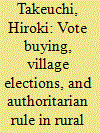

|
|
|
|
|
| Publication |
2013.
|
| Summary/Abstract |
Village elections are a democratic institution in one of the most resilient authoritarian regimes in the world. The Chinese Communist Party (CCP) has promoted village elections over the past twenty years, but not elections at higher levels. I present a game-theoretic model in which candidates would engage in vote buying when competing in a small electorate but not when competing in a larger electorate. The model's equilibrium outcome implies that the logic of China's introduction of village elections inherently limits this democratic reform to the grassroots level. Elections for higher levels of government would be dangerous to the regime because they would lead candidates to create substantive policy platforms and political organizations. Thus, rather than being an experiment that has failed to lead to further reforms, village democracy is self-limiting by design.
|
|
|
|
|
|
|
|
|
|
|
|
|
|
|
|
|
|
|
|
|